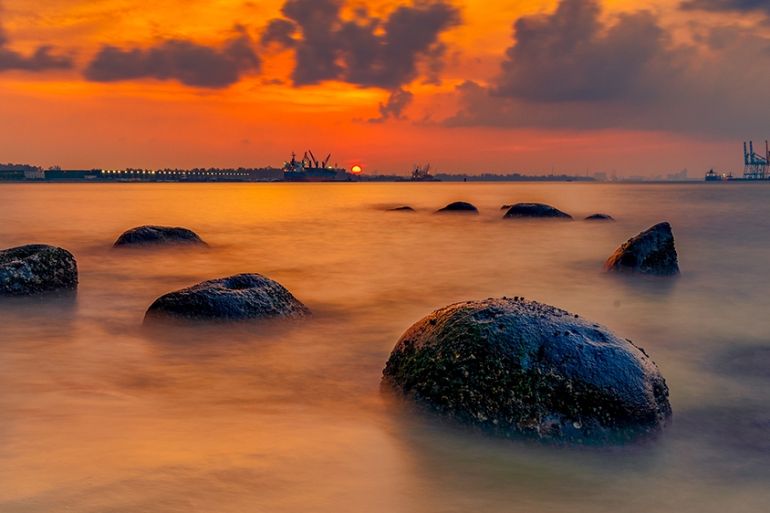If the Earth could speak: A boulder
Tide comes in, tide goes out. Boats spit oily fumes into the waves around me – but you already know this.

Today the tide is clear as it goes out. I see them again, so many carpet anemones the colour of gems, purple, green, shot through with sun. Peacock-tailed shrimp nestle among their tentacles, brushed this way and that by a gentle current, unbothered by the anemones’ venomous sting. A small, spotted fish swims too close and has no such luck, no shell to protect its jellied form. The tentacled carpet contracts and undulates. Sticky arms grasp the fish’s wriggling body and move it into the central mouth.
Yes, the anemones have mouths. What did you think? We are all hungry, all of us.
Keep reading
list of 4 itemsThe everyday items you never knew contained plastic
‘Don’t be afraid for the marshes’: The battle to save Iraq’s waterways
Why has the flooding in Kenya been so devastating?
I, too, was liquid once. I moved in the earth’s crust, slow and viscous, filled with heat. I glowed, I oozed. There was much power in me. And yet there I was, trapped in an underground pocket, moved this way and that by the laws of pressure and space. So much power and yet so little. Eventually I was allowed up. I cooled, I hardened. I was a bed of ocean rock. A time passed. You would consider it a long time. Above me were the tides, caressing my whole self, a dependable rhythm, a soothing friend. Above me was the weight of the entire ocean.
And then up again, pressure again, this time from beneath. There came a splintering pain, and I was no longer myself but many selves. Boulders, you would call us, large and small, some smooth, others jagged, all shedding granite dust with each pull of the tide. Then the ocean dipped and we were exposed. Here it came: Sun! Air! Wind!
Tide comes in, tide goes out. Time passes. You would consider it a long time. I enjoy being up here. I have grown accustomed to watching the mud crabs scuttle in the sand. Grey and translucent, no larger than the nail of a human thumb, the crabs roll tiny, perfect balls of mud as they dig their holes. It looks as if the ground itself is shifting, which of course, it is. The ground is shifting all the time even if you cannot feel it. I feel it. But enough about me; how about the looming mangroves, with their gnarled roots peeking up through the waves in search of breath? How about the dugongs, square-faced, fleshy-jawed, grazing as slow cows upon fields of sea grass? How about the butterflyfish, those small striped triangles flitting in the current like flags on boats?
Boats: spitting oily fumes into the waves, sending mudskippers scrambling, scaring hornbills from their perch. But you already know this. You know your boats, you know their enormous, trawling nets, you know the dynamite you toss into the seabed to stun the fish. It is your voices that cut through the humid air, practical, gleeful, bored.
Large boats, small boats. Boats with little juddering engines leaking plumes of smoke, boats the size of islands, making the sea tremble, sending giant waves crashing over us. Sand rises from the seabed, settles on the faces of corals and anemones, stops their pores and tiny mouths. Time passes. Even you would consider it not much time. The corals grow pale and brittle, the anemones shrink and harden. This is what death looks like.
Soon it is just me, me and the boats. The fish are gone, the crabs have vanished, the dugongs moved on to some richer, more plentiful sea. Only the mangroves remain. Boughs creaking and ancient in the wind, they howl terribly at night, little comfort to me. I cannot creak, I cannot sway. The boats come. Time passes. Tide comes in, tide goes out. As for me? Silent, still. Affixed to the bed of an emptying ocean, all I can do is watch. A time passes. You would consider it a long time.